Filter by
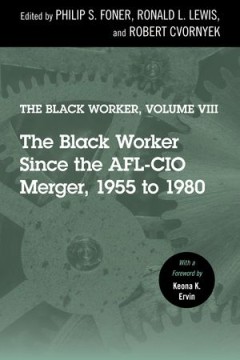
The Black Worker, Volume 8 : The Black Worker Since the AFL-CIO Merger, 195…
Published over the course of six years, the eight volumes of The Black Worker: From Colonial Times to the Present contain a voluminous amount of archival material. Through their publication, Philip S. Foner, Ronald L. Lewis, and Robert Cvornyek birthed a new generation of Black labor history scholarship. Theirs was big, synthesis-style, social, political, intellectual, and institutional history…
- Edition
- -
- ISBN/ISSN
- -
- Collation
- -
- Series Title
- -
- Call Number
- 650

The Black Worker, Volume 8 : The Black Worker Since the AFL-CIO Merger, 1955-…
Published over the course of six years, the eight volumes of The Black Worker: From Colonial Times to the Present contain a voluminous amount of archival material. Through their publication, Philip S. Foner, Ronald L. Lewis, and Robert Cvornyek birthed a new generation of Black labor history scholarship. Theirs was big, synthesis-style, social, political, intellectual, and institutional history…
- Edition
- -
- ISBN/ISSN
- -
- Collation
- -
- Series Title
- -
- Call Number
- 650
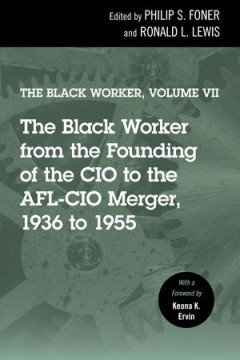
The Black Worker, Volume 7
Published over the course of six years, the eight volumes of The Black Worker: From Colonial Times to the Present contain a voluminous amount of archival material. Through their publication, Philip S. Foner, Ronald L. Lewis, and Robert Cvornyek birthed a new generation of Black labor history scholarship. Theirs was big, synthesis-style, social, political, intellectual, and institutional history…
- Edition
- -
- ISBN/ISSN
- -
- Collation
- -
- Series Title
- -
- Call Number
- 650
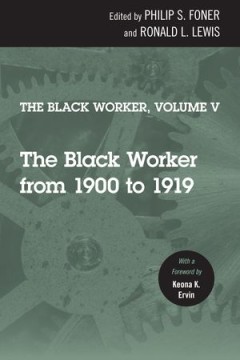
The Black Worker, Volume 5 : The Black Worker from 1900 to 1919
Published over the course of six years, the eight volumes of The Black Worker: From Colonial Times to the Presentcontain a voluminous amount of archival material. Through their publication, Philip S. Foner, Ronald L. Lewis, and Robert Cvornyek birthed a new generation of Black labor history scholarship. Theirs was big, synthesis-style, social, political, intellectual, and institutional history …
- Edition
- -
- ISBN/ISSN
- -
- Collation
- -
- Series Title
- -
- Call Number
- 650
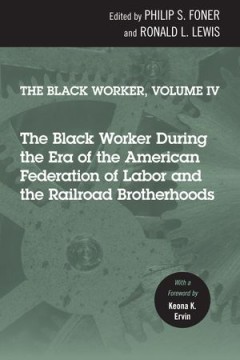
The Black Worker, Volume 4 : The Black Worker During the Era of the American …
Published over the course of six years, the eight volumes of The Black Worker: From Colonial Times to the Present contain a voluminous amount of archival material. Through their publication, Philip S. Foner, Ronald L. Lewis, and Robert Cvornyek birthed a new generation of Black labor history scholarship. Theirs was big, synthesis-style, social, political, intellectual, and institutional history…
- Edition
- -
- ISBN/ISSN
- -
- Collation
- -
- Series Title
- -
- Call Number
- 650
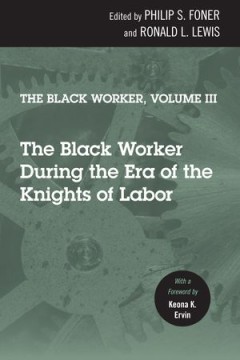
The Black Worker, Volume 3 : The Black Worker During the Era of the Knights o…
Published over the course of six years, the eight volumes of The Black Worker: From Colonial Times to the Present contain a voluminous amount of archival material. Through their publication, Philip S. Foner, Ronald L. Lewis, and Robert Cvornyek birthed a new generation of Black labor history scholarship. Theirs was big, synthesis-style, social, political, intellectual, and institutional history…
- Edition
- -
- ISBN/ISSN
- -
- Collation
- -
- Series Title
- -
- Call Number
- 650
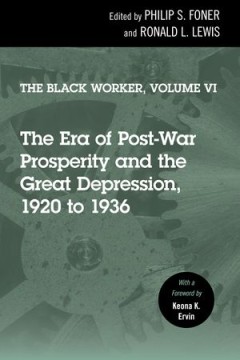
The Black Worker, Volume 6
Published over the course of six years, the eight volumes of The Black Worker: From Colonial Times to the Present contain a voluminous amount of archival material. Through their publication, Philip S. Foner, Ronald L. Lewis, and Robert Cvornyek birthed a new generation of Black labor history scholarship. Theirs was big, synthesis-style, social, political, intellectual, and institutional history…
- Edition
- -
- ISBN/ISSN
- -
- Collation
- -
- Series Title
- -
- Call Number
- 650
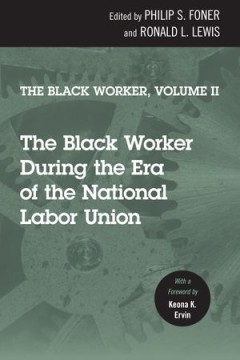
The Black Worker, Volume 2
Published over the course of six years, the eight volumes of The Black Worker: From Colonial Times to the Present contain a voluminous amount of archival material. Through their publication, Philip S. Foner, Ronald L. Lewis, and Robert Cvornyek birthed a new generation of Black labor history scholarship. Theirs was big, synthesis-style, social, political, intellectual, and institutional history…
- Edition
- -
- ISBN/ISSN
- -
- Collation
- -
- Series Title
- -
- Call Number
- 650
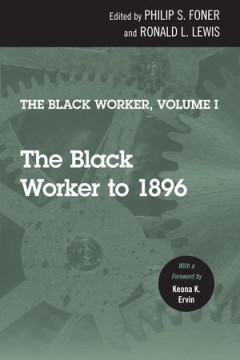
The Black Worker, Volume 1
Published over the course of six years, the eight volumes of The Black Worker: From Colonial Times to the Present contain a voluminous amount of archival material. Through their publication, Philip S. Foner, Ronald L. Lewis, and Robert Cvornyek birthed a new generation of Black labor history scholarship. Theirs was big, synthesis-style, social, political, intellectual, and institutional history…
- Edition
- -
- ISBN/ISSN
- -
- Collation
- -
- Series Title
- -
- Call Number
- 650
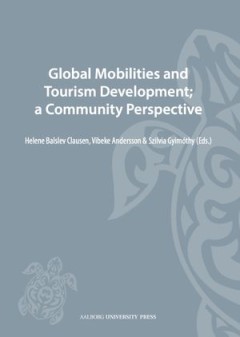
Global Mobilities and Tourism Development
Tourism has been advocated as a tool for socio-economic progress in the Global South for over three decades, however, the internationalization of emerging tourism economies aggravated rather than alleviated inequalities on local levels. Given that the bulk of sustainable tourism literature remains on the level of international policy measures (and the critique of these), we know little about ho…
- Edition
- -
- ISBN/ISSN
- 9788771123142
- Collation
- -
- Series Title
- -
- Call Number
- 650
 Computer Science, Information & General Works
Computer Science, Information & General Works  Philosophy & Psychology
Philosophy & Psychology  Religion
Religion  Social Sciences
Social Sciences  Language
Language  Pure Science
Pure Science  Applied Sciences
Applied Sciences  Art & Recreation
Art & Recreation  Literature
Literature  History & Geography
History & Geography